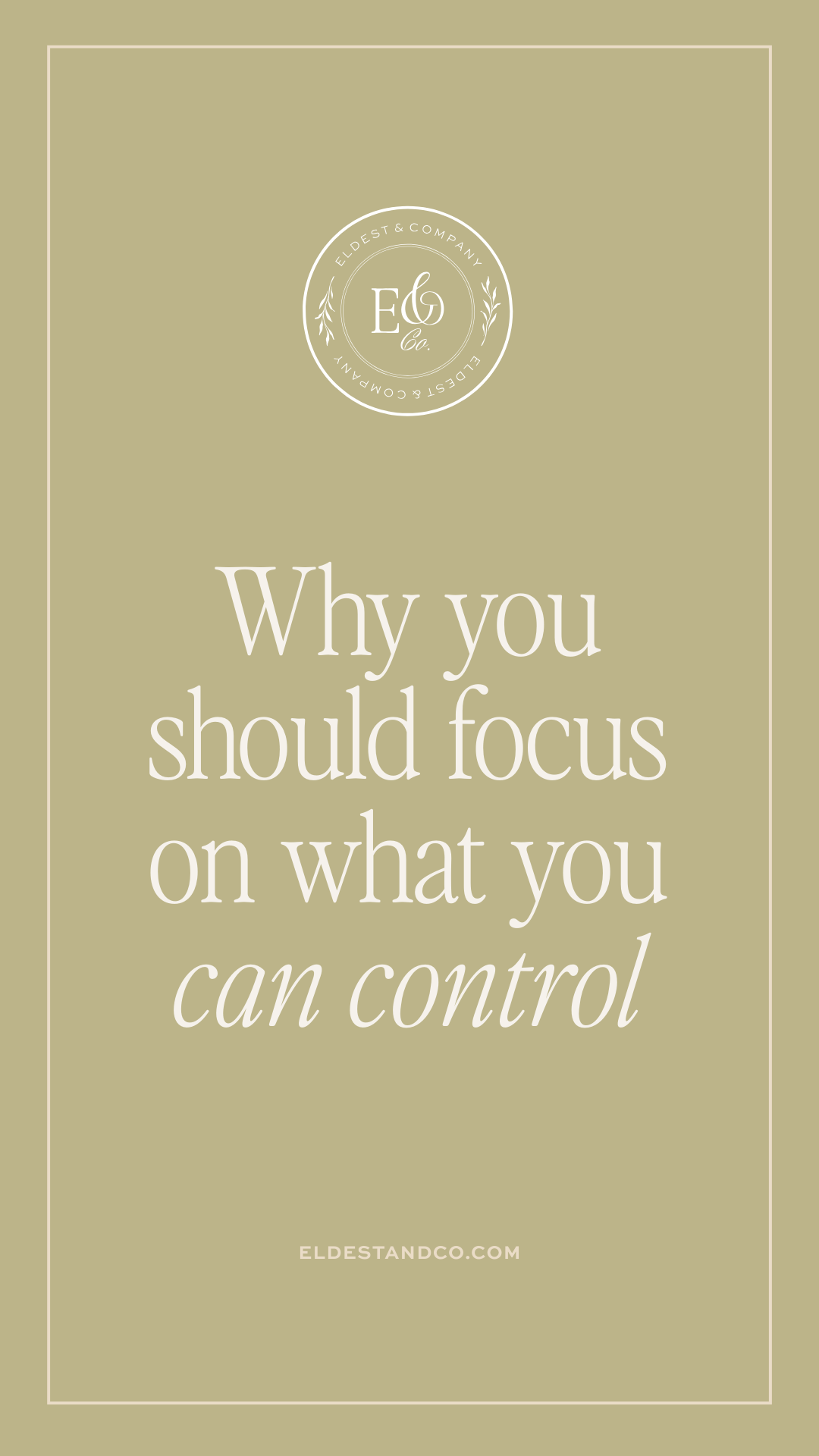Understanding fault vs responsibility: why taking ownership without blame changes everything
We've all been there. You get ghosted after what felt like a promising second date, passed over for a promotion you thought was in the bag, or find yourself on the receiving end of a friend's sudden coldness. The immediate spiral begins: "What did I do wrong? How could I have prevented this? Is this all my fault?"
If you're an eldest daughter, this mental gymnastics routine is probably as familiar as your morning coffee. We're wired to scan for our role in every disappointing outcome, convinced that if we can just identify what we did wrong, we can control it next time. But here's the thing we've learned through years of therapy, self-reflection, and honestly, some pretty painful trial and error: there's a massive difference between fault and responsibility, and understanding this distinction might just be the key to finally feeling free.
Which is why today we're diving into one of the most liberating concepts we've encountered: how to take ownership of your experience without drowning in blame.
The difference between fault and responsibility in relationships and life
Let's start by getting clear on what we're actually talking about here. When something goes sideways in our lives, we tend to conflate two very different concepts: fault and responsibility. But they're not the same thing, and treating them as if they are keeps us stuck in patterns that don't serve us.
Why we default to assuming fault (and why it feels so tempting)
Here's the uncomfortable truth: when we assume fault for situations that hurt us, we're actually trying to grab control in a world that often feels chaotic and unpredictable. Think about it. If you got ghosted because you said something "wrong" on the date, then theoretically, you can avoid saying that thing next time and prevent the pain from happening again.
Our founder, Samantha, puts it this way: "When we assume fault for a situation, while it can be painful and even harmful to our moods and psyche, we are taking some level of control." It's like a twisted form of empowerment. We'd rather blame ourselves than accept that some things are genuinely outside our influence.
This pattern is especially strong for those of us who grew up as the "responsible one." We learned early that taking charge of situations, even ones we didn't create, often led to better outcomes for everyone involved. But what worked when we were managing family dynamics at age twelve doesn't necessarily serve us in adult relationships and career situations.
The problem with this approach? If something genuinely wasn't your fault, then whatever you decide to change about your behavior probably won't prevent similar painful experiences in the future. You end up contorting yourself to avoid problems that were never really about you in the first place.
How to identify when something actually is (or isn't) your fault
So how do you know when you're genuinely at fault versus when you're just trying to make sense of a disappointing situation? We've found it helpful to look for very clear, concrete indicators.
You might genuinely be at fault when:
You were given explicit feedback or warnings that you didn't heed
You made a conscious choice that directly led to the outcome
You violated a clearly stated boundary or expectation
Your actions had obvious, predictable consequences that you chose to ignore
For example, if your boss had multiple conversations with you about meeting deadlines and you continued to submit work late, getting fired might genuinely be connected to your choices. If a partner clearly communicated that they needed more emotional availability and you consistently prioritized other things, the relationship ending might be partially on you.
But more often than not, disappointing outcomes aren't anyone's fault. They're either the result of multiple factors, incompatibility, timing, or circumstances completely outside anyone's control.
Consider these scenarios:
You went on a great first date, but the person decides you're not a romantic match because your lifestyles are fundamentally different
You applied for your dream job, but the company had to eliminate the position due to budget cuts
A friendship fades because you're both in different life stages with different priorities
In these cases, you could analyze your behavior until you're blue in the face, but the outcome likely had very little to do with anything you did "wrong."
The liberating truth about what you can actually control
Here's where things get interesting. Once you accept that you can't control other people's actions, feelings, or decisions, you might initially feel powerless. After all, if you can't influence whether someone ghosts you, chooses you for a job, or wants to maintain a friendship, what's the point of trying at all?
But you are completely in control of one very important thing: your experience of what happens to you.
When disappointing things occur, you get to choose how you interpret them, how long you dwell on them, and how you let them influence your future actions. You can decide that getting ghosted means you're fundamentally unlovable, or you can choose to see it as information about compatibility and move forward with your dating life intact.
Why responsibility is the key to unlocking change
I heard Mark Manson talk about this in a really useful way in a TikTok video years ago (that of course, now I can’t find). His example was: if you opened your door in the morning and there was a baby on your doorstep, it wasn’t your fault that the baby was abandoned but it is now your responsibility to figure out how to get this baby to a hospital or fire station to make sure they’re safe.
You were not the reason for the situation but you are now responsible for what to do next.
We can spend all our energy talking about how unfair it was that the baby was left on our doorstep but it doesn’t absolve us of the responsibility to do the next thing.
If you’re struggling to find a job or feel like dating is an eternal struggle, you might have seesawed between taking on too much fault and the not enough. One day it’s “there’s something wrong with me,” then another day it might sound like “there’s no good men out there.” In the job example, it might switch from “I’m just not qualified” to “companies just aren’t hiring right now.”
We can often beat ourselves up when we realize that we’ve taken on too much fault or not enough and then swing to the other extreme but that’s hurting more than it’s helping.
The real key is to distinguish between fault (which may or may not have anything to do with us) and our responsibility. Not what made the situation what it is, but what are we going to do with the information we have?
When you can recognize the things that are not your fault or even in your control, like the macroeconomy, the thoughts and actions of others or pure dumb luck, you leave yourself more mental energy to focus on what you can be responsible for - how do you show up, how consistently are you dedicating time to the goal, what’s your mindset on this matter, or what accountability system do you have sit up to help you follow through?
Fault vs. Responsibility is the unlock to take you away from self-criticism and blame and move you towards meaningful action that will actually help you make a difference.
Frequently asked questions
Q: If I don't analyze what went wrong, how will I learn and grow? A: There's a difference between healthy reflection and self-blame spirals. Ask yourself: "What can I learn from this situation?" rather than "What did I do wrong?" Focus on patterns you notice about your preferences, boundaries, or communication style rather than trying to prevent all future disappointment.
Q: Doesn't this approach make me passive? What about taking accountability? A: It only makes you passive if you just focus on the fault part and not the responsibility part. Taking responsibility for what you do next is calling you into action - it requires active choice-making about how you want to show up in the world. Fault often shifts us into feeling like the situation is already done and there’s no change possible, which is why we recommend focusing on responsibility instead.
Q: How do I know if I'm being too hard on myself or not hard enough? A: Pay attention to whether your self-reflection leads to actionable insights or just makes you feel worse about yourself. Productive reflection usually results in clarity about your values, boundaries, or communication patterns. Unproductive self-blame just creates anxiety and self-doubt.
Q: What if other people expect me to take responsibility for things that aren't my fault? A: This is where boundaries become crucial. You can acknowledge someone's feelings without accepting blame for causing them. Try phrases like "I can see you're upset, and I want to understand your perspective" rather than automatically apologizing for things you didn't do.
Q: How do I break the habit of immediately assuming fault when something goes wrong? A: Start by pausing when you notice the "what did I do wrong?" thoughts arising. Ask yourself: "What evidence do I have that this is my fault?" and "What other explanations might there be for this situation?" It takes practice, but you can retrain your brain to consider multiple possibilities rather than defaulting to self-blame.
This shift from fault-finding to responsibility-taking isn't just semantic. It's a fundamental reframe that can change how you move through the world. Instead of constantly trying to prevent all possible disappointment by controlling your behavior, you can focus your energy on building resilience, clarity, and self-trust. And honestly? That feels a lot more sustainable than trying to be perfect enough to avoid all of life's inevitable curveballs.
The goal isn't to never feel disappointed or hurt. It's to feel those things without immediately turning them into evidence that you're doing life wrong. Because most of the time, you're not. You're just human, navigating a complex world where not everything is within your control. And that's not a bug in the system – it's a feature.




